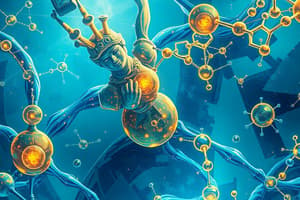Podcast
Questions and Answers
What is internal energy in the context of thermodynamics?
What is internal energy in the context of thermodynamics?
Internal energy refers to the energy content within a system, such as the energy stored in the bonds between atoms and molecules.
Define work and heat in the context of thermodynamics.
Define work and heat in the context of thermodynamics.
Work is done when a force acts through a distance, while heat is the transfer of energy from one object to another due to a temperature difference.
What is the First Law of Thermodynamics?
What is the First Law of Thermodynamics?
Energy cannot be created or destroyed, only converted from one form to another.
Who first established the key laws of thermodynamics?
Who first established the key laws of thermodynamics?
What does thermodynamics focus on?
What does thermodynamics focus on?
What is the Second Law of Thermodynamics?
What is the Second Law of Thermodynamics?
Define enthalpy and its relationship to heat and work in a chemical reaction.
Define enthalpy and its relationship to heat and work in a chemical reaction.
What is the significance of the Third Law of Thermodynamics in understanding the behavior of systems at extremely low temperatures?
What is the significance of the Third Law of Thermodynamics in understanding the behavior of systems at extremely low temperatures?
How does Hess's law contribute to our understanding of enthalpy changes in chemical reactions?
How does Hess's law contribute to our understanding of enthalpy changes in chemical reactions?
Explain the conditions for a spontaneous process to occur in the context of thermodynamics.
Explain the conditions for a spontaneous process to occur in the context of thermodynamics.
Flashcards are hidden until you start studying
Study Notes
Chemistry 11th: Thermodynamics
Thermodynamics is the study of heat and energy transfer, focusing on the laws of thermodynamics, energy changes during chemical reactions, and the relationship between work, heat, and chemical reactions. In this article, we will explore the key subtopics of thermodynamics in the context of Chemistry 11th.
Internal Energy
Internal energy refers to the energy content within a system, such as the energy stored in the bonds between atoms and molecules. It is an important concept in thermodynamics, as it helps us understand how energy changes during chemical reactions.
Work and Heat
Work and heat are two forms of energy transfer that play a crucial role in thermodynamics. Work is done when a force acts through a distance, while heat is the transfer of energy from one object to another due to a temperature difference. Both work and heat are essential for understanding energy changes in chemical reactions.
Laws of Thermodynamics
Thermodynamics is based on several laws that describe the behavior of energy in chemical systems. These laws, first established by physicist Rudolf Clausius, help us predict the direction and extent of energy changes in various processes. Some key laws include:
-
First Law of Thermodynamics: Energy cannot be created or destroyed, only converted from one form to another. This law, also known as the law of conservation of energy, states that the total energy of an isolated system remains constant.
-
Second Law of Thermodynamics: In any irreversible process, the entropy (a measure of disorder) increases over time. This law, often referred to as the arrow of time, indicates the direction of spontaneous change in an isolated system.
-
Third Law of Thermodynamics: As the temperature of a system approaches absolute zero, the entropy approaches a constant value. This law, also known as Nernst's theorem, helps us understand the behavior of systems at extremely low temperatures.
Enthalpy and Hess's Law
Enthaly is a measure of the energy content of a substance, and the change in enthalpy (ΔH) is related to the heat (Q) and work (W) done during a chemical reaction. Hess's law states that the sum of the enthalpy changes for a reaction is equal to the enthalpy of the products minus the enthalpy of the reactants. This law allows us to calculate the enthalpy changes for various types of reactions, such as synthesis and decomposition reactions.
Spontaneity and Gibbs Free Energy
Spontaneous processes are those that occur naturally, requiring no external intervention. In the context of thermodynamics, spontaneous processes occur when the free energy (G) decreases, resulting in a negative Gibbs free energy change (ΔG < 0). The Gibbs free energy is a measure of the potential work that can be extracted from a system, and its change helps us determine the direction of spontaneous change.
Applications of Thermodynamics
Thermodynamics has numerous practical applications in various fields, including energy production, transportation, and everyday life. For example, thermodynamics can help us analyze the efficiency of engines, design heating and cooling systems, and understand the mechanisms behind chemical reactions.
In conclusion, thermodynamics is a fundamental concept in chemistry, providing us with a deeper understanding of energy changes and the behavior of chemical systems. By studying the laws of thermodynamics, we can predict the direction and extent of energy changes in various processes, paving the way for a more effective use of energy in our daily lives.
Studying That Suits You
Use AI to generate personalized quizzes and flashcards to suit your learning preferences.




